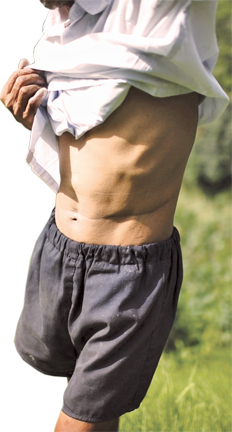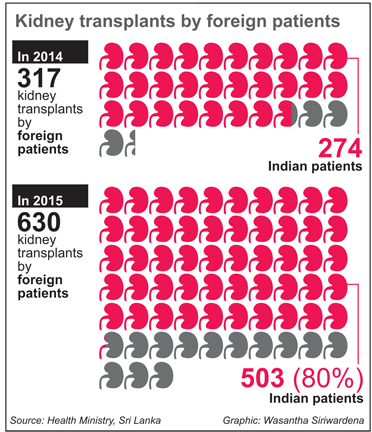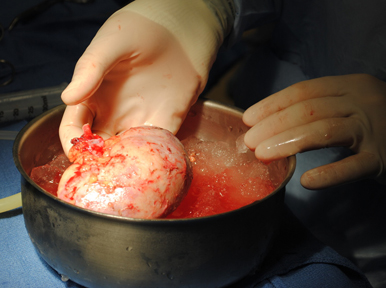The kidney quandary
Sri Lanka yet to unravel locals' involvement in an
ongoing kidney transplant racket:
by Chathuri Dissanayake
 |
|
Poverty is linked to
organ donation (squarespace.com) |
| |
Three months ago, the Indian media exposed a thriving kidney trade
between the two countries, shocking the Sri Lankan health sector and
raising eyebrows about the organ transplant rackets and system failures.
Indian media, quoting their police sources, named six Sri Lankan
doctors who were allegedly linked to the racket together with six
privately-managed hospitals.
Reeling under intense scrutiny and public pressure, local health
authorities appointed not one but two different committees to
investigate the matter. The problem however, is not new. The report
produced by one of the two committees and submitted to the Ministry of
Health in February only opened a Pandora's Box with some
parliamentarians claiming to be aware of the ongoing racket.
The report was not published and there was no follow up action.
A ban on kidney transplants on foreigners was promptly imposed
following the allegations. A separate police investigation launched by
the Colombo Crime Division(CCD) is making slow progress, adding to the
confusion.
Although eight Indian nationals (donors) were arrested, only six had
undergone surgery to remove their kidneys. So far, the police had failed
to establish a link between to kidney donations to any monetary
transactions. .
Old issue with new spin
Sri Lanka's Transplantation of Human Tissues Act enacted in 1987,
explain in detail the legal procedures applicable for organ donations
and transplant within the territory. Sri Lanka has taken many strides in
tissue transplant surgery and has since become a popular destination for
medical tourism. In the end, Sri Lanka has ended up as a cheap and
hassle-free option for kidney transplants for those aiming to bypass
legal barriers in their home countries.
The kidney controversy erupted in 2011, placing Sri Lanka under the
spotlight as a country linked to a flourishinginternational kidney
trade, complete with foreign buyers and sellers.
Many foreign nationals exploited the loopholes in the regulations to
trade in kidneys. At the time, local regulations did not specify any
criteria regarding the nationality of the 'donor' and the 'donee.'
Following revelations that Sri Lankans were 'donating' their organs -
mostly kidneys, not only to other Sri Lankans but also to foreigners -
especially the Maldivians and Israeli (for money), the authorities
imposed a new set of regulations to prevent Sri Lankans from 'donating'
their organs to foreign nationals.
This resulted in foreign patients having to bring their own donors to
Sri Lanka. Undeterred, racketeers found a new way to bypass the
authorities, again. Many foreign patients - especially Israelis, began
bringing their long-lost "relatives" from all over the world, prompting
local health authorities to further tighten the laws governing tissue
transplant in the country.
 The
Health Ministry next introduced another regulation, limiting donors and
recipients to one and the same country, but had limited success. The
Health Ministry next introduced another regulation, limiting donors and
recipients to one and the same country, but had limited success.
Fresh controversy
In 2013, fresh allegations emerged, following the death of a donor at
a Sri Lankan private hospital. In the latter part of 2013, the Ministry
of Health appointed a two-member team, Director of Private Health Sector
Development Dr. Kanthi Ariyaratne and the Deputy Director, Dr. A.I.
Jagoda, to probe the matter.
It is reliably learnt that the 2013 investigation was limited to a
mere data gathering exercise. The report and the statistics were
submitted to the Director General of Health Services, Dr. Palitha
Maheepala.
According to Health Ministry sources, the authorities refrained from
taking stern action against the racket due to fears of the island's
growing medical tourism industry having to suffer negative consequences.
In January 2016, the issue resurfaced when the Indian media disclosed
details of a kidney racket that linked both countries. Six men arrested
for allegedly selling their kidneys disclosed the names of six doctors
from Sri Lanka's private healthcare system -Lanka Hospital, Western
Infirmary (Pvt) Ltd., Nawaloka Hospital and Hemas Hospital - all
Colombo-based hospitals - and the Kandy Nursing Home.
However, these hospitals are known for carrying out streamlined
transplant surgeries monitored by the Ministry of Health.
Following the Indian media splash, Health Ministry quickly appointed
a three-member team, comprising Director of Private Hospital Services
Dr. Kanthi Ariyaratne, Western Province Health Services Director Dr.
Deepthi Perera and a senior official of the Health Ministry's
Investigation Unit. A report was due in one week.
Within a fortnight, Health Minister Dr. Rajitha Senaratne appointed
another high-powered five-member team to inquire into the matter, headed
by Deputy Director General (DDG) of Health Services, Dr. Jayasundara
Bandara. Minister Senaratne also called upon the Inspector General of
Police for a separate independent police inquiry. The police
investigation report was later handed over to the Colombo Crime
Division(CCD).
The ministerial investigation uncovered a number of irregularities in
the approval procedures, a member of the five -member team told the
Sunday Observer, on the basis of anonymity. According to the member,
there was no evidence to implicate any of the consultant nephrologists
or surgeons performing surgeries at the private hospitals that were
mentioned.
"The probe uncovered the involvement of middlemen, but not doctors or
Health Ministry officials. This limits our ability to take action. This
is the reason for referring the inquiry to the police," the source
explained.
The police investigation resulted in the arrest of eight Indian
nationals, currently held in custody at the Mirihana Immigration
Facility. Some 286 items in their possession too have been submitted to
court.
CCD sources confirmed the recovered items included rubber stamps of
Indian doctors and lawyers as well as letterheads. Police are currently
checking whether the documents are forged, the source said.
 |
|
Sri Lankan hospitals
now under close scrutiny
(squarespace.com) |
In addition, police are to scrutinise all documents submitted to the
Health Ministry by the six persons, for the verification of
authenticity. So far, no link has been made between the surgeries and
monetary benefits for the donors.
"Two of the arrested persons do not have passports. We suspect the
passports are with the middlemen. We are pursuing the matter," the
source added. Admittedly, faced with language barriers and logistical
issues, the police are making slow progress and are turning to the
Indian Police for some leads.
"We are seriously limited in our capacity to investigate due to
language constraints. Correspondence with the Indian authorities is also
proving difficult. We now hope to send a team to India," CCD's Director
General, ASP K.N.J. Wedasinghe said.
GMOA action
The Government Medical Officers' Association (GMOA) has remained
vocal about the issue from the beginning and has openly expressed its
suspicions over 'Indian motives' in accusing Sri Lankan doctors of being
involved in the kidney racket. The GMOA has been calling for the
undisclosed ministerial report, without success. The GMOA has called for
a copy of the February report, said GMOA Secretary, Dr. Nalinda Herath.
"The Minister claims of sharing the report with the relevant
authorities but has not disclosed the identities of those authorities,"
Dr. Herath said, adding that the contents of the report are well
concealed as far as the public and the medical profession are concerned. |

